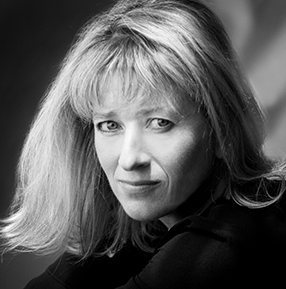Photograph of People Dancing in France
It's true that you don't know them--nor do I know what I wanted their movement to say when I tucked them in an envelope with words for you. I thought it was my life caught in a warm night. I believed myself loved by the wan and delicate man you see dancing against the drop-off behind them all. But you can't see that they are on a mountain, that just beyond the railings is a ravine, abrupt and studded with thorn, beyond it, a river, dry bed of stone that, by the time you take the photo from the envelope, will have filled with green foam of cold torrents from high in the Alps. This is France, you think, as you look at the people dancing, but there is nothing of France visible save one branch of a tree close enough to catch in their hair. I could tell you that by the time you see this picture, the young girl with the long jaw launching her bared navel at the lens will have bedded the man you're afraid of losing me to. There is food on the table, French food, and so more beautiful for that, green olives in brine, a local cake in paper lace, sliced tomatoes that look in the flash like flesh with their red spill of curve and seed. I could tell you they grew not twenty meters from the table where you see them, that I picked them one day with the small woman who bares her breasts in this photo because she is about to leave us and doesn't know any other way to say she is sad. They're alive is all you'll say of the scene, which is to say you feel you're not. It is November by the time I've thought to send you the photo, by the time I feel myself ready to part with the image. By then, the woman of the manifest breasts has left us, and the one with the dark eyes who loved her has darker eyes. Very soon after this dancing stopped, the man with the hollow cheeks took the girl of the ripe navel to his bed because he, like you, is so afraid of dying, he invites it daily, to try him. The girl's last lover was a boy on heroin in Cairo with the possible end of them both asleep in his blood, and now too in the blood of the lover I wanted to save. Because you are married to a woman who insists on wearing her dead sister's clothes, you understand that while I am not in this picture, I am in this picture. Know that I need never see it again to see: the incessant knot of the girl's navel is a fist, an oily wad of sweet-sour girl flesh, a ball of tissue I twisted and crushed all of that evening, and since. You refuse to remember her name, or his, because you want to be my lover again, and the others must be kept abstract. They were alive you say again, not more, because the heart is nothing if not a grave. You want me because your wife holds out her familiar wrist to you in the terrible sleeve of her dead sister's dress, because I reach for the gaunt cheek of the man who worships at the luminous inch of belly on the girl who lifts her arms from the body of a boy none of us will ever know in Cairo, the girl, who dead center in the photo, lifts the potent, mocking extravagance of her flash-drenched arms, and dances for us all.
Credit
Copyright © 2002 by Leslie Adrienne Miller. Reprinted from Eat Quite Everything You See with permission of Graywolf Press, Saint Paul, Minnesota. All rights reserved.
Date Published
01/01/2002

